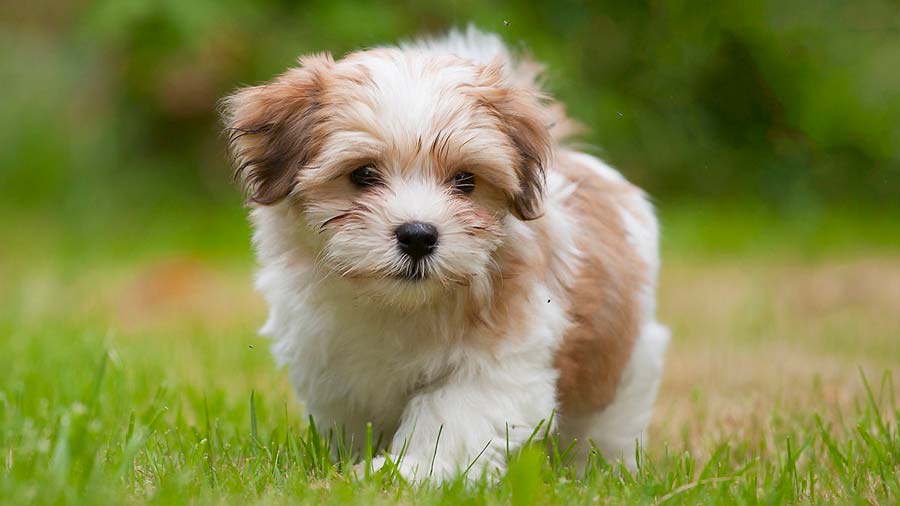7 Tips and Trips for Caring for Your Havanese Puppy
Havanese dogs are the national dog breed of Cuba. They are a type of Bichon, which is a small breed of dog. It is believed that the Havenese breed stems from several cross breedings in order to have reached the final product. The Blanquito and the poodle are two that it is said to be a part of the Havanese lineage. Havanese are also referred to as the “Havana Silk Dog,” due to their long, silky fur. Their tails are long and they carry them over their backs, similar to that of a Shih-Tzu. Their personalities are energetic and high-spirited and they walk with a spring in their step, a gait that distinguishes them from all other breeds. This breed loves people and they are highly adaptable to family environments. They love and need to be well socialized and will become depressed if they are not. They do not do well if they have to be isolated from people or are left alone for long periods of time; however a work days time is fine if left with something to play with! Although they are small in stature, they are not considered toy breeds. The average weight is 10-16 pounds and can be 8.5-11.5 inches in height. If you are considering a Havanese puppy for your family, keep reading to learn 7 important tips for caring for your Havanese puppy.
Follow These 7 Steps
For Success!!
1. Create a Routine
Like children, puppies thrive on routine. It is important to start your puppy on a daily routine as soon as possible. Creating a routine helps to adapt your puppy to your lifestyle as well as it helps develop structure and discipline. When your puppy knows what to expect, they are better able to focus on training and will receive your instruction better and quicker, such as, making him sit before you attach his leash before walks, as opposed to allowing him to be jumping around while you try to attach it. Routine can be, putting your puppy in his crate at the same time every day for crate training, walks that are set at the same time each day, feedings, exercise and playtime. When your puppy develops his routine, he will feel secure knowing what each day will bring and helps to relax him and keep him stress-free from puppy-hood, to adulthood. This is an important part of taking care of your Havanese puppy for a happier, healthier dog.
2. Crate Training
Crate training your puppy is one step that will help give your dog boundaries in your home and help to train him in multiple ways, including housebreaking. Letting your new Havanese puppy have free reign over your home will only create chaos and lots of messes you won’t want to deal with. Many people feel bad for putting their puppy in a crate. They view it as cruel or maybe that they are punishing their puppy. The reality is, that crates serve as a sense of security for you puppy, even as they get older. Dogs are naturally drawn to a den-like environment. Dens make dogs feel safe and secure, and crates are one way to help create the same security for them. They also help to train your puppy what his boundaries in your home are. They prevent him from getting into your personal property and chewing, or having accidents on your floor. Crate training should start right away when you get your new puppy, to introduce him to it and start him on learning what is expected of him in his new home.
3. Feedings
Your puppy will require a good, nutritious diet. Feeding your Havanese puppy high quality dog food is important to good health and nutrition. You can find out what food your breeder had him on and keep to the same brand of food. If you switch food brands, it’s important to make a gradual change, adding a little of the new brand each meal, increasing the amount each time for a week or more, until eventually the food is all new brand. Table scraps may be tempting to give your pup, but human food can be disruptive to your puppy’s digestive system, even adult dogs
4. Discipline
Disciplining your puppy for his wrong behavior is part of training, however, disciplining in anger will frighten your puppy, confuse him and create a fear of you rather than respect for being the pack leader. Never hit your Havanese puppy, not even in scolding. Use a stern tone to give your command without incorporating his name in a negative, scolding tone. Being consistent with disciplining lets him know his behavior is not what is expected from you, and he will learn quicker when you discipline him for bad behavior – chewing, running away, jumping on furniture, whatever you expect from your new puppy.
5. Socialize Your Puppy
Socializing your puppy is a critical in properly caring for your Havanese puppy. It is not only beneficial for you and others, but for your puppy. You do not want your puppy growing up afraid of everything and everyone. Getting him acquainted with different situations, people, pets, and environments means your puppy will grow into a well adjusted adult who can be easy-go-lucky and not stressed, anxious or aggressive in a variety of situations, or around other people other than you.
6. Health Checks
Your breeder should have gotten all of your puppy’s first shots and check-up, however, it’s important to make sure you follow-up with your vet on the routine checks your breeder recommends. Keeping your dog healthy with routine veterinary check-ups helps to keep your dog healthy. Regular checks means the sooner medical conditions are caught, the easier and quicker they can be treated.
7. Playtime
Havanese dogs are spirited little dogs that are well-kept in small environments – small houses, apartments, etc. Although they are little, you will still want to get your pup outside to walk or have playtime in the house to let him get his exercise and energy out. Playtime also helps to get your pup’s mind active so that he doesn’t get bored. Bored dogs can mean destructive dogs, so be sure to include plenty of playtime in your Havanese pup’s day.
Complete Guide
to “firsts” for your puppy
Your Puppies First Night Home
Put any of her food/water away after 6/7pm to make sure their bladder, etc. is empty. Otherwise, you’ll be making trips to the bathroom all night, or worse, end up with a mess in their crate!
Shortly before their “bedtime” spend some time playing with your puppy. You want them to be tired enough to sleep soundly. Never let them nap within the hour or two before you go to sleep. If you do you’ll end up with a playful puppy just as you’re ready to climb into bed.
Make sure to take them outside to do her business before putting them in her crate. Remember to give them lots of praise to reinforce their positive behavior.
If your puppy starts crying at night, you need to decide if they have to go to the bathroom or if they are looking for attention. If they have been quiet for a few hours and suddenly starts to cry or whine, they may need to go out. Puppies have small bladders, so you’ll likely have to take them out at least once during the night.
Do Not Wake Them Up to Bring Outside
If your puppy is crying and you’re sure it’s not for need of relieving herself, reach down and soothe her a little.
DO NOT CODDLE YOUR PUPPY.
This will only reinforce the negative behavior and they will cry even more. If they continues to whine, a sharp toned “Enough” should settle the matter. If they continue, ignore them. Tough love may be difficult, but eventually your puppy will learn that crying at night gets them nowhere. The more persistent you are in your approach, the quicker the situation will be resolved. If you’re stern one minute and sympathetic the next, your puppy will only be confused and their behavior will continue.
In the morning, get up right away and take your puppy outside to do her business. Carry them. Don’t let them walk there or they may be tempted to go before they gets outside. Let them empty everything out, and praise them when they are finished.
As with any new baby, you may not get much sleep the first night with puppy. If you’re patient and understanding, your puppy will learn what you expect of them when it’s time to sleep. You both should wake up rested and ready for the day after a few nights together.
Your Puppies First Week
The first week home will get progressively better. Within a few days, you’ll notice them watching you and even getting excited to see you! You may even be surprised by their different reactions. Rest assured that as their personality emerges it’s a positive sign that they are feeling safe and welcomed with their new family! Make sure to establish the new routine immediately and stick to it. During the first week home, learning this routine and their name should be most important!
During the first week your puppy should learn:
Where they eat
Where they sleep
Where they go to the bathroom
Where they play



